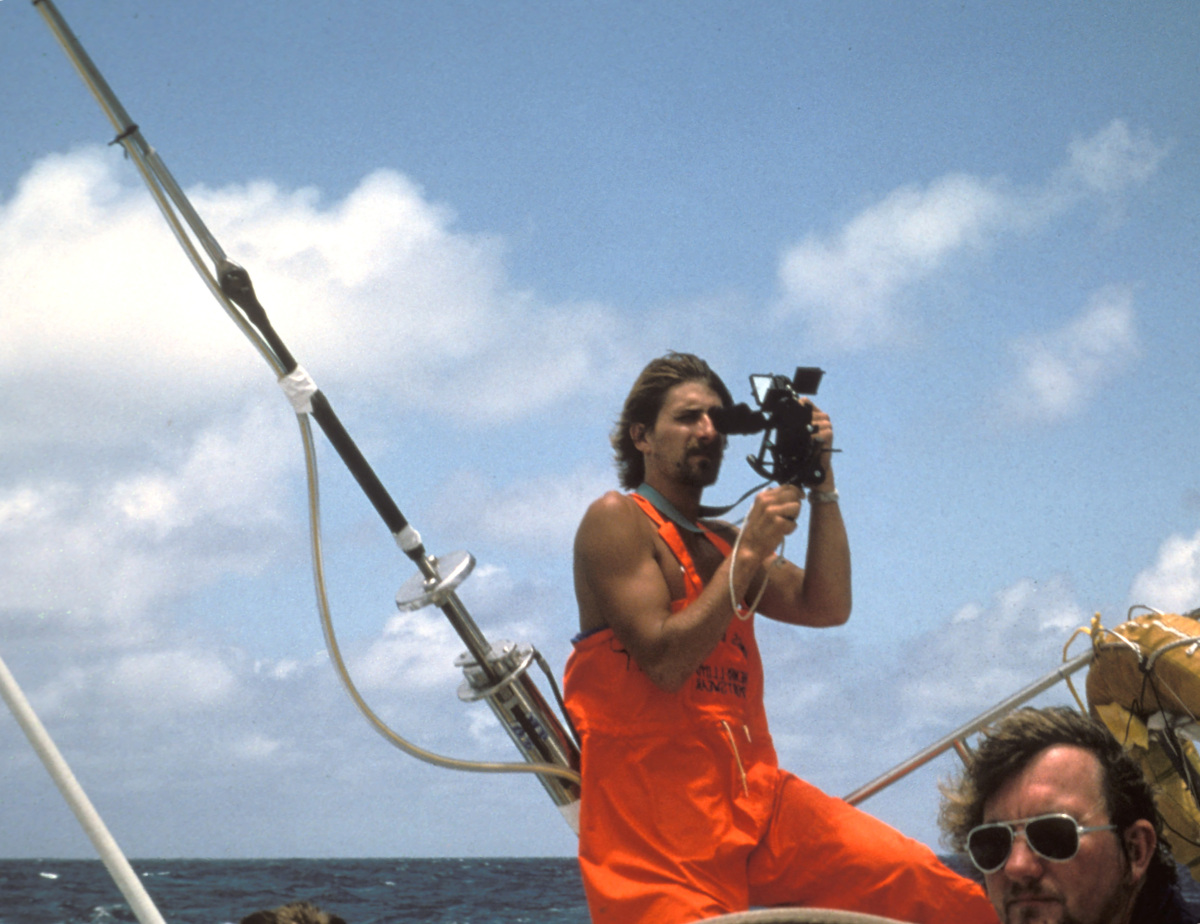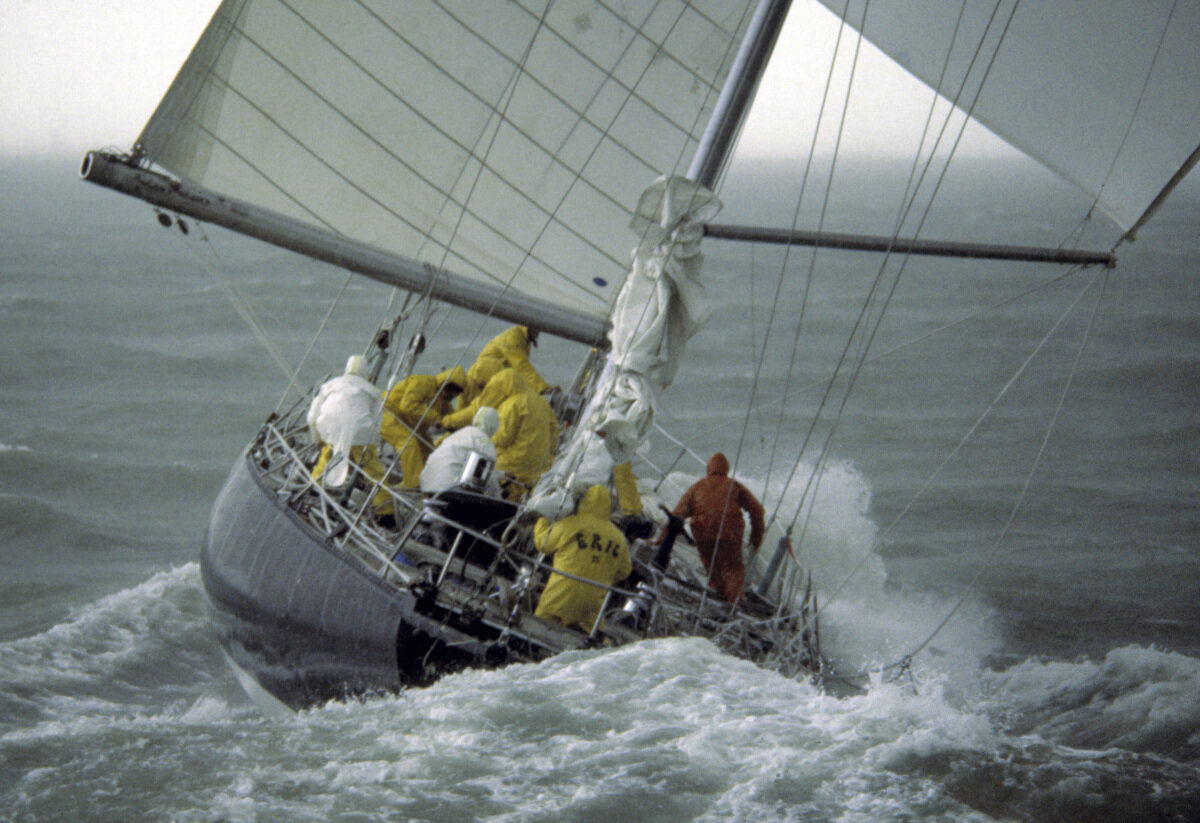According to legend it all started over a beer in a Portsmouth pub; nearly 50 years on, it is still gale-force winds, mountainous seas and sleep deprivation.
The history of the race known as - Whitbread Round the World Race (1973-2001) - Volvo Ocean Race (2001-2019) - The Ocean Race (Upcoming in 2021-2022)
Sir Peter Blake, winner of the 1989/90 Whitbread Round the World Race on Steinlager II, holding the Whitbread Trophy aloft.
In 1969 Robin Knox-Johnston won The Sunday Times Golden Globe Race and history was born on two fronts. He had not only become the first man to complete a single-handed non-stop circumnavigation of the planet, but he had also put an idea in the minds of two men that would ultimately change the face of offshore yachting. Guy Pearce and Anthony Churchill were fascinated by Knox-Johnston’s feat, but, pertinently, they were convinced of the potential of a crewed race following the old square rigger routes around the world.
Nothing of its kind existed at the time and skippers were drawn in by the promise of such an adventure. Finding a sponsor and an organising club proved difficult until Churchill and Pearce took their plan to the Royal Naval Sailing Association, who they wanted to run the race. Something clicked and, so the story goes, in 1971 in a smoky pub in Portsmouth Colonel Bill Whitbread, of the brewing family, and Admiral Otto Steiner, of the Royal Naval Sailing Association, met to enjoy a beer and discuss the proposal. The first race would be held in 1973.
The first Ocean race
1989/90 Whitbread Round the World Race: Fazisi, skippered by Skip Novak
Some 17 boats carrying 167 sailors left the Solent, the stretch of water between the south coast of the UK and the Isle of Wight, on September 8, 1973 and headed south for Cape Town. Their yachts were the standard ocean cruisers of the time and the crews were, generally speaking, adventurers paying for the privilege or servicemen on an exciting training mission. The skippers were experienced and got paid but the spirit was Corinthian and this was very much a step into the unknown for almost everyone.
They raced with the tools of the time, navigating by dead reckoning and sextant (Roddy Ainslie, a skipper from that first race, admitted his boat was lost much of the time). Their paths followed those of the old square riggers of the 19th century and boats were comfortable. There were separate cabins for the lucky, shared ones for those who weren’t, and stories emanating from Sayula II, the winner of that first lap, told of six bottles of wine being consumed per day. Fridges packed with fresh meat were standard and it was not uncommon in the first few editions for a full-time cook to live onboard.
1989/90 Whitbread Round the World Yacht Race: 'Maiden' skippered by Tracy Edwards
The challenge
Whitbread / Volvo 60 MERIT CUP skippered by Grant Dalton at the start of the 1997/8 Whitbread Round the World Yacht Race 1997/8
The adventure came from the challenge of taking on the oceans and the elements at their most unpredictable, surviving enormous journeys to far-flung places. Tragically, three sailors were lost in that first race, but the lessons learned have been part of the continuing evolution of the sport.
Five decades on from Pearce and Churchill's brainwave, there has been a quantum leap in development. The most expensive, advanced technologies have gone into the transformation, leaving no stone unturned in pursuit of greater speeds. And yet the lifestyles of the crews could not be more primitive. While some sailors dispute the often told tales of sawn-off, weight-saving, shared toothbrushes, the attention that goes into making a light boat has bordered on obsession. One race legend of the 1997-98 event told a story of the winning skipper yelling at his crew because three pair of sunglasses had been placed on the leeward side of the boat. The cabins, wine, meat, cooks and fresh water have long since gone, replaced by shared bunks, desalinated water, rehydrated powder food and protein bars. The crews are world champions, Olympic champions and only the most talented youngsters get a foot in the door.
S/V ADVENTURE sailing by a crew representing The Royal Navy Sailing Association (RNSA) competing in the 1973/4 Race
The reasons are professionalism and the need to win. Whereas that first race in 1973 drew huge numbers of private entries, today it is contested by yachts sponsored for millions by top brands. Technology nowadays enables live link-ups and real time viewing of the boats and 24-hour surveillance from embedded reporters. Modern media is now showing the world what previously could only be imagined and reconstructed via sailors’ accounts. What viewers are seeing is an ocean as dangerous as ever - and injuries as frequent and chilling - but these are space-age boats regularly driven to breaking point by crews whose sole motivation is to win one of the toughest events in sport.
The fleet of Volvo 60's moored at Ocean Village on race day
sails we have collected from
this Historic race
VO70 Ericsson 3
Sails from the Volvo Open 70, Ericsson 3, were donated to OV by Giovanni Soldini and Team Maserati. Products are currently available via custom order; these limited edition products are being created from the GS-3 Stay Sail that endured the Volvo Ocean Race’s life at the extreme in 2008-2009.
VO70 Groupama 4
Sails from the winning yacht team Groupama on Volvo Open 70, Groupama 4, skippered by Frank Commas, were donated to OV by The Sailing Foundation. Limited edition products are being currently being created from the J4-D Head Sail that endured the Volvo Ocean Race’s life at the extreme in 2011-2012!
VO70 CampeR
Original Sails from the Volvo Open 70, Camper, were donated to OV by The Sailing Foundation. The boat and team graphics were designed by World Acclaimed British Graphic Designer, Mark Farrow. Camper and Emirates Team New Zealand was skippered by Chris Nicholson where these sails have endured the Volvo Ocean Race’s life at the extreme in 2011-2012.
VO70 Puma
Original Sails from the Volvo Open 70, Puma, were donated to OV by The Sailing Foundation. These Sails were originally used by Puma Ocean Racing, skippered by Ken Read and have endured the Volvo Ocean Race’s life at the extreme in 2008-2009.
Whitbread/VO60 Amer Sports Team One
Original Sails from the Whitbread/Volvo Open 60, Amer Sport One, were donated to OV by The Atlas Sailing Program. These Sails were original to Team Amer Sport One, skippered by four time Whitbread Veteran, Grant Dalton, and have endured the first Volvo Ocean Race’s life at the extreme in 2000-2001.














